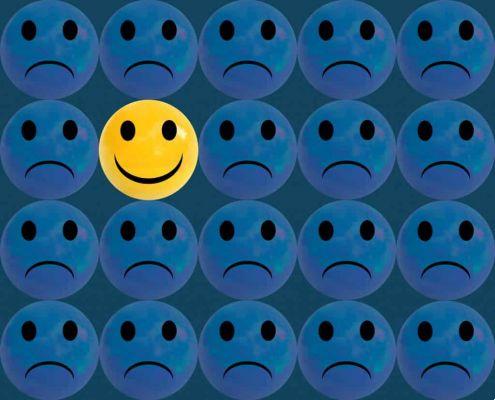“Lift your head!”, “Don't be like that, no, put a smile on your face”, “Why are you sad? You have/conquered it here”… You must have heard or even spoken some of these phrases. Did you know that, despite having an apparently positive tone, they can actually be quite harmful to the mental health of those who listen?
This type of statement/question is what some psychologists call toxic positivity. Have you ever heard that expression? Do you know what it's about? We prepared an article explaining this concept and justifying why it can be so harmful in our daily lives.
What is toxic positivity?
There is no exact definition for what toxic positivity is, as it is a new concept. But, in summary, we can say that it is a worldview that does not allow negative feelings, such as sadness, disappointment, frustration, among others. Toxic positivity phrases always have the sense of denying the person who hears the “opportunity” to be sad, as if we always had to be happy and satisfied.
“Avoiding suffering is a form of suffering,” wrote American writer Mark Manson, author of the bestselling book “The Subtle Art of Giving the Fuck.” And he's right, since our emotions are there to be expressed. Otherwise, if they are “dammed”, they may “burst” at some point. That is, if you are sad, ignore the "rule" of not being able to be feeling that way, and be - life allows and so-called negative feelings can, in the end, do us good and promote growth.
Toxic positivity or optimism?
A lot of people confuse optimism with toxic positivity, but the truth is that they are very different things, especially in the exact point of the way these two postures face sadness.
The one who acts with toxic positivity denies negative feelings, acts as if they don't exist, as if happiness and joy are the only positive states. The optimist, in turn, recognizes the negative situation, but believes that it will be possible to get out of it or that there are more positives than negatives, after all.

So telling someone, "It's going to be okay" depends a lot on how you're approaching that person's feelings. Did you hear her talk about what bothers her? Did you allow her to express herself and give voice to her negative feelings? And on top of that, did you “justify” your optimistic statement or just say an empty “it's going to be okay” without any arguments that help you think and feel more positivity, but positivity with content?
How does toxic positivity affect us?
We live in a society that leaves no room for weakness. Feeling sad, desolate, unmotivated, frustrated is giving space to negative feelings - and there's nothing wrong with that! Nobody is happy or sad all the time. So it should be normal to have space to express the negative emotions that sometimes come over us.
The “repression” of negative feelings often begins within ourselves, that is, without outside interference. When we feel bad, we automatically feel guilty, as if we don't have the right to be feeling something negative — it's toxic positivity rooted deep in each of us, preventing us from giving space to sadness, for example.

In addition, it hurts even more when we have the courage to expose what we are feeling or thinking, but we hear the person we talk to reduce what we are going through and make superficial statements, such as "It won't be like this, no", "This will pass" or “Everything will be fine”, offering absolutely no help other than an empty and apparently positive phrase.
Toxic positivity, therefore, is one of the worst traps we can fall into. Especially since, as explained, it often comes from ourselves, when we silence our voice and come to think that we cannot take into account our feelings and emotions. And every time they end up “escaping,” it translates into guilt and unease.
May we increasingly keep in mind that feeling bad and having bad days or phases is common. I have it, you have it, everyone will have it at some point in their life. May sadness not be a reason for fear, guilt or shame for anyone!
The importance of also experiencing bad feelings
Because we are raised in this society that imposes the search for happiness as the only possible path and that installs this guilt in us in the moments when we recognize for ourselves or for someone that we are sad, we see sadness and bad feelings as things that should be avoided. at all costs or that shouldn't even be felt - which makes us miss out on a gigantic potential that negative emotions have.
Think of all the positive changes you've made in your life: they started from some inconvenience, right? Think about the lessons you learned and the mistakes you stopped making because of them: this was only possible because you went through negative situations, welcomed yourself and learned, right?

Finally, we can give infinite examples to show that we should not run away from negative feelings, but live them, just as we live the positive ones. Life doesn't just happen when we are happy and positive. Bad times are part of it and, although we cannot adopt a posture of accepting sadness and being satisfied with it, neither can we deny its existence and try to “run” to get out of the situation we find ourselves in.
“The emotional color palette encompasses dysregulated emotions such as sadness, frustration, anger, anxiety or envy. We cannot ignore that, as human beings, we have that range of emotions that have a use and that give us information about what happens in our environment and in our body”, explains psychologist Antonio Rodellar, specialist in anxiety disorders in an interview with UOL. In other words, don't ignore your sadness. Be welcoming to learn from her!
Take your time, be patient with yourself and learn what you can from bad situations, thoughts and emotions. Think: the world is naturally too cruel to you, so be a safe haven for yourself, not someone who does you even more harm.
toxic people
It is not always possible to avoid socializing with people who deny you the right to be sad and make these statements full of toxic positivity. But, if you realize that there is such a relationship in your life, cut ties with this person, who probably doesn't want the best for you. If you can't cut ties—or if you don't want to—have an honest conversation with this person and let them know that you're expressing yourself to them for help and comfort, not even more discomfort from being sad.
You may also like
- What are Holistic Therapies?
- Everything you need to know about therapy
- Know the differences between Psychoanalysis, Psychiatry and Psychology
- About Toxic Behaviors and Why You Should Walk Away
- Saying no is also necessary
And finally, haven't you been a toxic person to yourself? Have you allowed yourself to feel the negative inside of you? Have you welcomed yourself or have you produced even more guilt, discomfort and sadness in yourself? Remember that you are the most important person in your life… No one can take such good care of you as yourself.
These are the main characteristics and consequences of this posture known as toxic positivity. Did you realize how it can be quite harmful to our well-being and our quality of life? Be careful to avoid relationships that have this characteristic and be very welcoming with yourself!

























